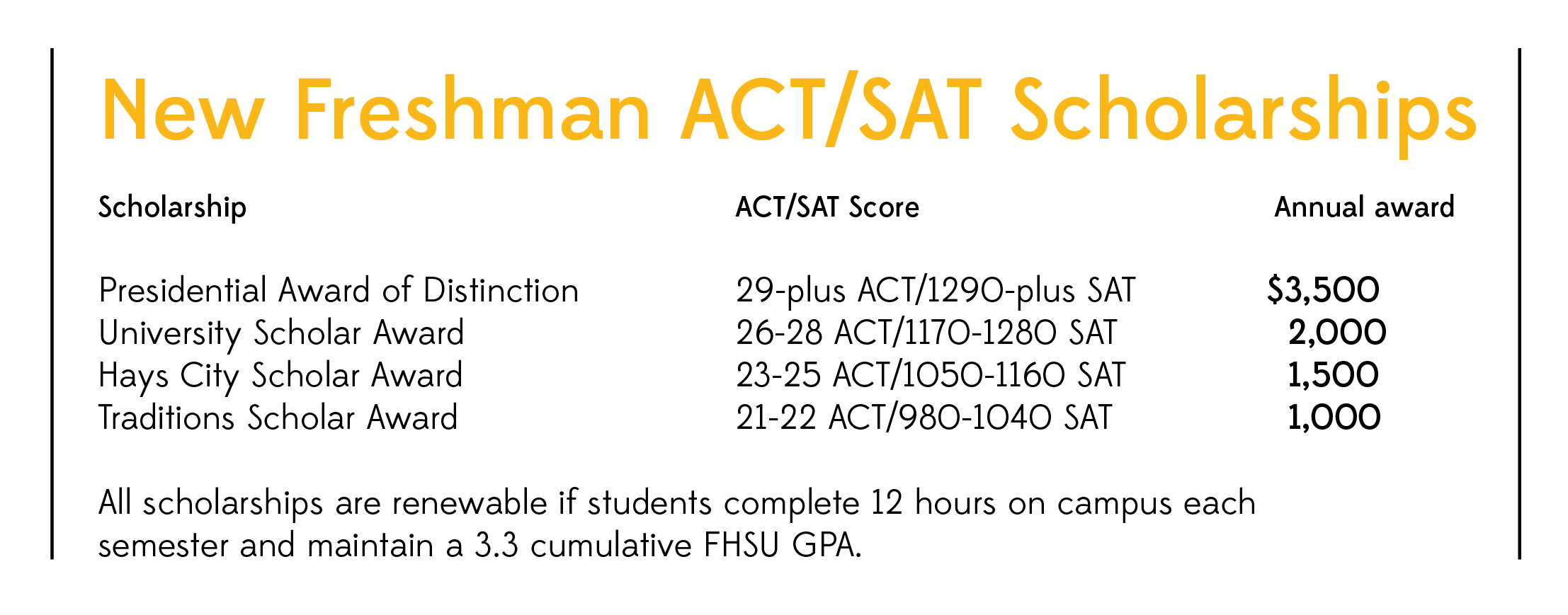Changes in scholarship programs make FHSU even more affordable

10/14/15
By Diane Gasper-O'Brien
University Relations and Marketing
HAYS, Kan. -- Incoming freshmen to Fort Hays State University will see a significant raise in ACT/SAT scholarships for the 2016-17 school year.
In the past, the top award to first-time freshmen with an ACT of 30 or higher was $3,200. That total included a one-time $2,000 presidential award and a $1,200 award renewable for three additional years.
Now, students with an ACT of 29 or higher will receive a $3,500 award, the Presidential Award of Distinction, with that total amount renewable for three more years by maintaining 3.3 FHSU cumulative GPA.
Students with an ACT score of 26 to 28 will receive the University Scholar Award of $2,000, and those with an ACT score of 23 to 25 will receive the $1,500 Hays City Scholar Award. Both are renewable for three more years.
The largest increases percentage-wise will go to students in the 21-22 ACT range. Before, students with 22 and 21 ACT scores, respectively, received one-time awards of $700 and $500. The new range for those two ACT scores is $1,000, the Traditions Scholar Award, renewable for three additional years.
The entire list of new ACT/SAT scholarship amounts, which also include SAT ranges, is listed in the accompanying table.
"We've already heard lots of positive comments out in the schools," said Tricia Cline, director of admissions. "There's a lot of excitement about it."
The ACT/SAT scholarship is just one of several programs that have boosted FHSU's scholarship numbers. At the same time, numerous programs have been recognized by a variety of organizations as some of the best in the nation, making FHSU an even more attractive destination of choice.
The aggressive, one-year Power of One Scholarship Campaign that concluded in December 2014 resulted in an additional $12 million for scholarships.
In fiscal year 2015, FHSU awarded more than $5 million in scholarships.
In addition to the new ACT/SAT scholarship program, scholarship awards for incoming transfer students, which previously tapped out at $1,000, were increased considerably and now range from $1,000 to $3,000.
"It's not just about recruitment. It's about retention, and we've put resources together so you can get to the finish line," said Dr. Joey Linn, vice president for student affairs. "We're committing our resources to the students so they don't have to go further in debt. That's a big part of this, by making our scholarships renewable. We tweaked things and came up with what we think is a very awesome program. We were excited because it's a difference maker."
Cline said she already has seen the new numbers catching the attention of prospective students.
"Right after we decided this, we were at Hays High doing concurrent enrollment," she said. "They were super excited to hear these numbers."
There are numerous methods to earning financial assistance for college, and scholarships are a major part of helping with education costs.
"The awareness of budgetary needs of students has been at the forefront for several years based on the decrease in state funding," said Tim Chapman, president and CEO of the FHSU Foundation. "Due to this, all initiatives have scholarships as the number one priority."
"What's great about FHSU is that we've been able to keep tuition affordable," Linn said. "Plus we've got first-class facilities and programs as well as outstanding faculty."
FHSU President Mirta M. Martin agreed.
"While we do have the lowest tuition rate in the state and the second lowest in the country, our affordability does not equate to lack of quality in our programs," she said. "Quite the contrary. Our small classes, individualized attention and state-of-the-art facilities yield impressive results.
"We want everyone to know we're the destination of choice and that we want to attract to FHSU the bright minds of Kansas and of our nation," she added. "To do so, we've taken a hard look at our scholarship funding and made the strategic decision to align our merit scholarships with our state and our national peers to attract and to welcome these bright minds."
In addition to low tuition rates for Kansas students, the contiguous states tuition program -- for students in bordering states Colorado, Nebraska, Oklahoma and Missouri -- has proved a popular drawing point.
However, Chapman said the fall 2015 semester is the first time in the university's history that revenue from tuition surpassed the state funding allocation.
Therefore, he said, "tuition will continue to climb, and the weight and need for private support will also be at a premium."
Thus, the need for more scholarships.
"Not only do scholarships ease the increasing financial burden of attending school," Chapman said, "but they also attract and reward exceptional, highly motivated students who make up a well-rounded academic environment."